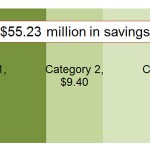UPDATED: Tax Reform and Medicaid Money-Go-Round
Originally posted 4/23/12:
In the ever-expanding web of regulations, tax laws, bureaucracies, and entitlements, it’s not always clear who is paying whom for what. An excellent example arose where Rhode Island’s personal income tax reform intersected with its policy for Medicaid long-term care reimbursements.
As the Current pointed out in March, projections for Rhode Island’s 2010 tax reform showed that every income category would have winners and losers. In fact, because the categories are based on federal adjusted gross income,* eight RI-resident households showing no income at all were projected to owe $3,188 each in new taxes. Thousands of additional taxpayers making below $30,000 were projected to owe money, as well, but the amounts were all less than $175.
The reason some low-income families saw tax increases with the revenue-neutral reform has to do with their itemization. Because the standard deduction increased while itemization was eliminated, households with high tax deductions would lose out, no matter their income. The two major groups affected by the change were those with high investments in such things as business and housing and those with high medical expenses.
When this issue came to the attention of Executive Office of Health and Human Services Medicaid Director Elena Nicolella, she issued a memo on March 12, noting:
The problem arises when a person eligible for Medicaid Long-term Care, who is spending almost all his or her income to contribute towards the cost of care, is faced with a State tax liability. This person may not have available funds to pay the State tax.
Paying the tax instead of the medical bills could result in a patient’s losing both care and Medicaid eligibility. To ease the burden of that decision, Nicolella’s department determined to decrease the patient liability of people eligible for Medicaid-funded long-term care. In practical terms, the service provider (mostly nursing homes) are instructed to forgive the liability, and the state will “make them whole,” the next month, or over multiple payments, if necessary, Nicolella told the Current.
That may seem like a wash — with the state paying the extra money it has taken in via taxation to the providers who would have received it as payment, anyway — but things aren’t quite so simple. According to Nicolella, the federal government actually matches the state’s expenditures, ultimately paying 52¢ of every dollar.
At the time of this writing, the Current could not verify whether these new claims count toward the cap imposed by the Global Medicaid Waiver. If so, the extra money would have to be found somewhere within the system. If not, it would represent an additional tax on federal taxpayers.
That said, Nicolella is surprised at how little response the policy has gotten from Medicaid recipients. Although, those paying a growing tax bill may have delayed until the last moment. Alternately, if the individual amounts were low, patients may have determined that the reimbursement wasn’t worth the effort of compiling the necessary documentation, which included the following:
- A letter indicating the tax liability owed is a direct result of the inability to deduct medical expenses;
- signed and dated RI 1040 Resident tax forms reflecting the tax owed
- a copy of the check sent to the Rhode Island Division of Taxation or proof of electronic payment;
- a copy of the bank statement showing the check was cashed; and
- Form 2848 Power of Attorney (if necessary)
The tax reform passed in the spring of 2010. Two years later, its effects still aren’t clear, but the political law of increasing bureaucratic complexity has been bolstered by more evidence.
* Thanks to Revenue Analysis Chief Paul Dion for clarifying that, where I had used “taxable,” “federal adjusted gross” would be more accurate.
ADDENDUM (5/7/12):
Executive Office of Health and Human Services Medicaid Director Elena Nicolella tells the Current that the policy covers long-term care patients’ “per diem rate” and that the matching federal funds “would contribute to the State cap under the 1115 Global Waiver.” However, she stresses that the “State is not close to its cap, so this action would not result in the need to remove funding from another area,” and a “significant increase in expenditures” is not anticipated, in any event.
The $12.1 billion cap covers a five-year “demonstration” period.



